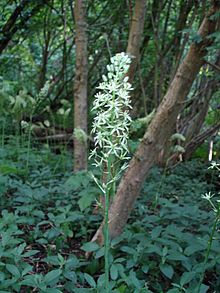Cleeve Wood, Hanham facts for kids
| Site of Special Scientific Interest | |

Flowering Bath asparagus
|
|
| Area of Search | Avon |
|---|---|
| Grid reference | ST655703 |
| Interest | Biological |
| Area | 8.9 hectare |
| Notification | 1966 |
| Location map | English Nature |
Cleeve Wood in Hanham, South Gloucestershire, is a special natural area. It is known as a Site of Special Scientific Interest (SSSI). This means it's a protected place because of its unique plants, animals, or geology. Cleeve Wood was officially recognized as an SSSI in 1966.
This important woodland covers about 8.9 hectares. That's roughly the size of 12 football fields! It is located on the steep, south-facing slopes of the River Avon valley, close to the city of Bristol.
Contents
What Makes Cleeve Wood Special?
The main reason Cleeve Wood is protected is its amazing population of a plant called Bath Asparagus. This plant is quite rare in many places. However, Cleeve Wood has the largest and most stable group of Bath Asparagus plants in its main growing area.
The Unique Bath Asparagus Plant
Bath Asparagus (Ornithogalum pyrenaicum) is a type of wild plant. It has tall, green shoots that look a bit like asparagus. In late spring, it grows pretty, pale yellow-green flowers. Finding such a large group of these plants in one place makes Cleeve Wood very important for nature.
Trees and Plants in the Wood
Cleeve Wood is mainly a type of forest called a calcareous Ash-Wych Elm wood. This means it grows on soil rich in lime. Over the years, some non-native trees have been planted here. These include Beech and Sycamore. You might also spot some Horse Chestnut and Cypress trees.
Native Trees and Shrubs
In the more natural parts of the wood, Ash (Fraxinus excelsior) trees are common. You can also find occasional Pedunculate Oak (Quercus robur) trees. The lower layer of plants, called the shrub layer, has many native species. These include Field Maple (Acer campestre), Hawthorn (Crataegus monogyna), Elder (Sambucus nigra), Hazel (Corylus avellana), and young Wych Elm (Ulmus glabra).
Ground Plants
The ground layer in many areas is covered by Ivy (Hedera helix). This is especially true on slopes where the ground has been disturbed. Other common plants growing on the forest floor include Dog's Mercury (Mercurialis perennis) and Bluebell (Hyacinthoides non-scripta). You might also see Stinking Iris (Iris foetidissima), Traveller's Joy (Clematis vitalba), and Slender False Brome (Brachypodium sylvaticum). These plants all add to the rich variety of life in Cleeve Wood.
 | Jackie Robinson |
 | Jack Johnson |
 | Althea Gibson |
 | Arthur Ashe |
 | Muhammad Ali |

